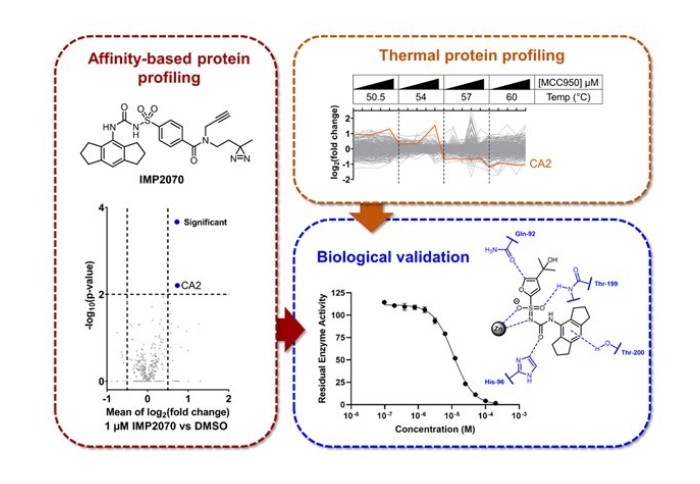A probe for NLRP3 inflammasome inhibitor MCC950 identifies CA2 as novel target

Congratulations to Dr Cassandra Kennedy and co-authors on the publication of their work in ACS Chemical Biology.
The inflammasome is a multiprotein signalling complex that is activated in response to infection, cellular damage, or stress and is implicated in a range of autoimmune and inflammatory disorders. Current clinical inhibitors of inflammasome pathways are not specific to particular stimuli or to cell death driven by a specific class of inflammasome. As a result, there has been a lot of interest in development of specific small molecule inflammasome inhibitors, particularly those of the NLRP3 (nucleotide binding and oligomerization domain, leucine-rich repeat and pyrin containing protein 3) inflammasome. One such potent, small molecule inhibitor is MCC950 which has shown encouraging results in a variety of animal models including for multiple sclerosis, Alzheimer’s and Parkinson’s diseases and no off-target effects had previously been identified.
This paper describes the first proteome-wide unbiased target profiles for MCC950. Cassandra designed and synthesised a novel photoaffinitybased probe (AfBP) for MCC950 (IMP2070) and showed that it directly engages with NLRP3 and retains inhibitory activity against the NLRP3 inflammasome. De novo target identification with IMP2070 and thermal proteome profiling further identified multiple potential MCC950 off-targets including carbonic anhydrase 2 (CA2), and biochemical assays confirmed MCC950 as a non-competitive CA2 inhibitor.
This work highlights potential biological mechanisms through which MCC950, and derivatives, may exhibit off-target effects in preclinical or clinical studies and will be useful in interpretation of both prior and future in vitro and in vivo studies using MCC950.
Cassandra completed her PhD in the group in 2020 as part of the ICB CDT and was co-supervised by Avinash Shenoy and is now working in the group of Katrin Rittinger in collaboration with the GSK LinkLabs at the Francis Crick Institute.
Congratulations to all involved!
Article supporters
Article text (excluding photos or graphics) © Imperial College London.
Photos and graphics subject to third party copyright used with permission or © Imperial College London.
Reporter
Jennie Hutton
Department of Chemistry